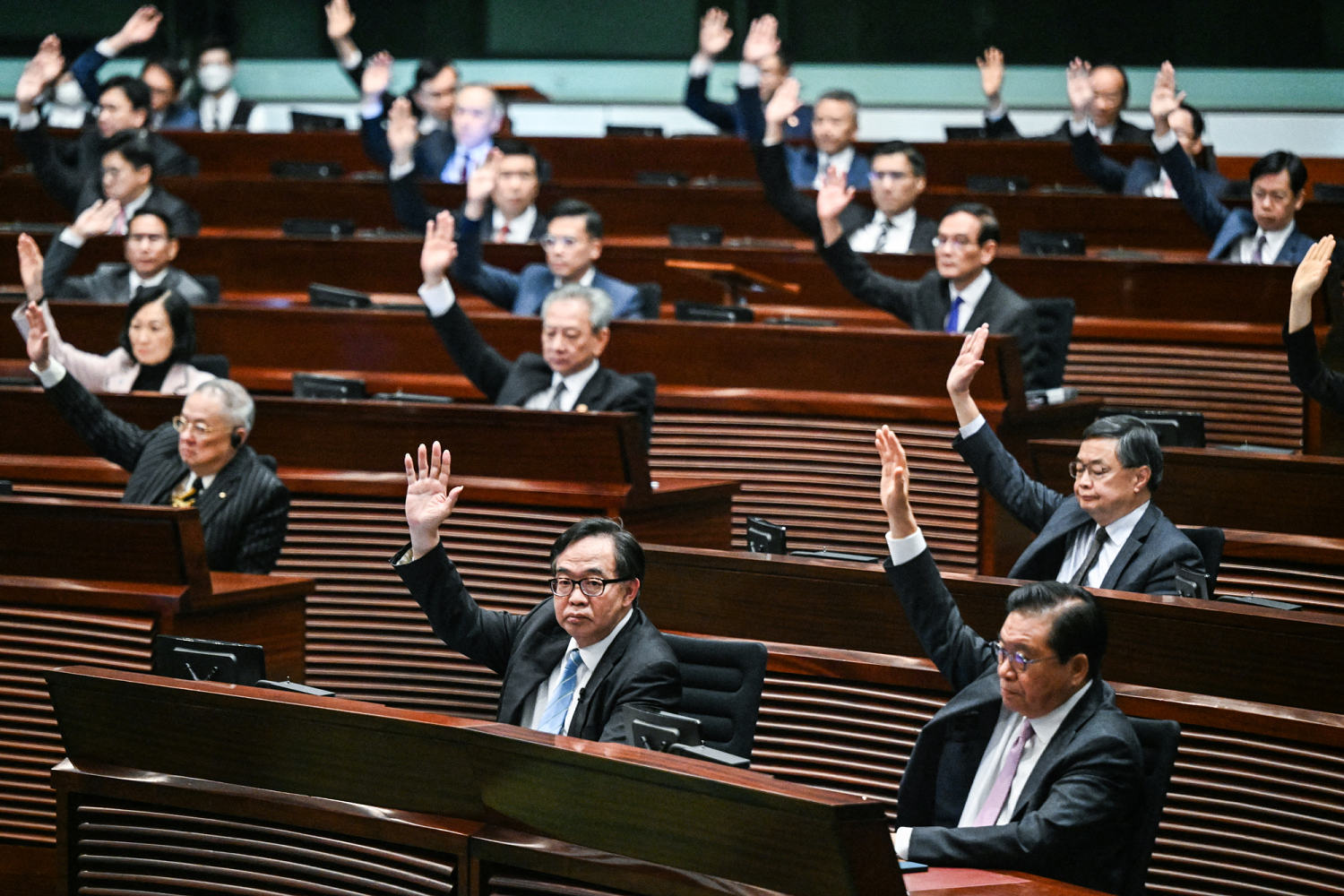China pushes back on international criticism of restrictive new Hong Kong law

HONG KONG — China hit back Wednesday against international criticism of a new national security law passed in Hong Kong, dismissing concerns that it will further erode civil liberties in the Chinese territory.
The United States and other governments have expressed opposition to the legislation, known as Article 23, which Hong Kong lawmakers passed unanimously Tuesday night after deliberating at record speed.
“We strongly deplore and firmly oppose individual countries and organizations’ slandering and smear against the Safeguarding National Security Bill of Hong Kong,” Chinese Foreign Ministry spokesperson Lin Jian said at a regular news briefing in Beijing, referring to the Article 23 legislation.
The local law criminalizes treason, insurrection, theft of state secrets and espionage, sabotage endangering national security, and external interference. It is meant to supplement a sweeping national security law imposed by Beijing in 2020.
The Hong Kong and Chinese governments say both laws are necessary to restore stability after 2019 pro-democracy protests that sometimes turned violent. But critics say they are driving a broad crackdown on dissent in Hong Kong, a former British colony whose Western-style civil liberties such as freedom of expression were guaranteed for 50 years when it returned to Chinese sovereignty in 1997.
John Lee, Hong Kong’s top leader, welcomed the bill’s passage as a “historic moment” for the city, saying it would take effect Saturday.
With the bill’s passage, he told Hong Kong lawmakers Tuesday night, “we will be able to effectively safeguard national security, allowing Hong Kong to move forward without worries or burden, and focus on developing the economy and improving people’s livelihoods.”
The new law toughens penalties and makes changes that critics say undermine due process. Treason, insurrection and some forms of sabotage are punishable by life imprisonment.
Like Beijing’s national security law, the local legislation purports to apply not just to residents and businesses inside Hong Kong but aims to ensnare those living outside its borders as well.
Hong Kong is required to enact the Article 23 legislation under its Basic Law, which serves as its mini-constitution. A previous attempt failed in 2003 when an estimated 500,000 of Hong Kong’s 7.5 million people took to the streets in protest, forcing the government to withdraw its bill.
Since Beijing’s national security law was imposed in 2020, the pro-democratic opposition in Hong Kong has been all but wiped out and mass protests of any sort have become a thing of the past. Hong Kong officials had been promising to pass Article 23 legislation for months, limiting public consultation to one month compared with three months when the bill was last introduced in 2002.
After the public consultation period ended Feb. 28, the Hong Kong government said that it had received more than 13,000 submissions, down from more than 90,000 in 2002, and that 98.6% of them were in support of the legislation.
The others, they said, were either unclear in their stance or in opposition, including some from “overseas anti-China organizations or abscondees,” a reference to pro-democracy activists who have fled Hong Kong.
Under pressure from Beijing, Article 23 draft legislation was gazetted March 8 and sailed through Hong Kong’s 90-seat Legislative Council in under 11 days, faster than any other law since 1997.
Dominic Chiu, senior analyst for China and Northeast Asia at the New York-based consulting firm Eurasia Group, said the urgency with which the law was passed was “highly unusual.”
“It was meant to cut short the risk of prolonged debate leading to a mobilization of international opposition,” he said in a note. “This was therefore likely a deliberate effort to catch foreign observers of Article 23 off guard by minimizing time for external scrutiny and criticism.”
On Tuesday, the U.S. State Department described the new crimes the law establishes, such as external interference, as “poorly defined and incredibly vague.”
“We believe that these kinds of actions have the potential to accelerate the closing of Hong Kong’s once open society,” spokesperson Vedant Patel told reporters.
In a joint letter to Secretary of State Antony Blinken last week in response to Article 23, the House Select Committee on the Chinese Communist Party and the Congressional-Executive Commission on China called for a re-evaluation of U.S. business and travel advisories for Hong Kong and the closure of Hong Kong economic and trade offices in the U.S. They also recommended U.S. government sanctions on Hong Kong officials “who have played an instrumental role in carrying out Beijing’s bidding to undermine democratic freedoms and the…
Read More: China pushes back on international criticism of restrictive new Hong Kong law

